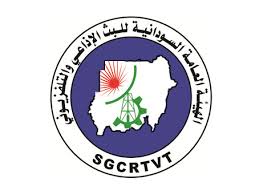الهيئة العامة السودانية للبث الإذاعي و التلفزيوني

تعريف عن الهيئة:-
في يوليو 2009م صدر قرار من مجلس الوزراء بأمر تأسيس الهيئة العامة السودانية للبث الاذاعى و التلفزيوني
أغراض الهيئة :-
- توظيف الوسائل والوسائط الحديثة والشبكة الدولية للمعلومات لتحقيق رسالة الإعلام الاذاعى و التلفزيوني
- تنظيم البث وإعادة البث والترخيص للمحطات الإذاعية والتلفزيونية
- توثيق العلاقات الهندسية والفنية مع الهيئات والمؤسسات و المنظمات النظيرة الإقليمية و الدولية
- تنمية القدرات الفنية لدى العاملين
- التعاون الفني مع الأجهزة الولائية العاملة في المجال
- توظيف وسائل الاتصال لأغرض البث وإعادة البث الاذاعى والتلفزيوني للجهات المرخص لها في المجال
- تقديم الخدمات والاستثمارات في المجال
سلطات الهيئة :-
بالإضافة إلى السلطات المنصوص عليها في قانون الهيئات العامة لسنة 2003م، تكون للهيئة السلطات الآتية:-
- إقامة وإدارة محطات الإرسال والاتصال لأغراض البث الإذاعي والتلفزيوني.
- استيراد الأجهزة التقنية اللازمة للبث الإذاعي والتلفزيوني .
- الحصول على حاجات الهيئة من الآلات والمعدات وقطع الغيار ووسائل النقل والخدمات والمستلزمات الأخرى في المجال.
- استثمار أموالها.
- إبرام العقود.
- امتلاك الأراضي والعقارات وشراؤها وبيعها واستئجارها وتشييد المباني عليها في حدود أغراضها.
- قبول الهبات واقتراض الأموال وفق القانون.
- أي سلطات أخرى تكون لازمة لتحقيق أغراضها.
مجلس الإدارة:
اختصاصات المجلس وسلطاته
بالإضافة للاختصاصات المنصوص عليها في قانون الهيئات لسنة 2003 تكون للمجلس الاختصاصات والسلطات الآتية:
- الموافقة على استيعاب بعض الكوادر والخبرات بموجب عقود عمل خاصة
- مراجعة الأثر العام للبث الإذاعي والتلفزيوني
- إصدار توجيهات إجراء البحوث لتقويم عمل الهيئة
- اعتماد مشروعات الاستثمار والقروض والمنح
- تحديد إدارات الهيئة ومهامها وعلاقاتها ببعضها
- اعتماد إنشاء فروع أو مكاتب داخل أو خارج السودان
- اعتماد سياسات التنسيق مع الأجهزة الولائية ذات الصلة
- إجازة مقترحات الموازنة السنوية
- تلقي الشكاوي المتعلقة بالهيئة من الأفراد والمؤسسات
- إعداد التقرير السنوي عن الهيئة وخططها المستقبلية
- وضع اللوائح الداخلية المنظمة لعمل الهيئة
المدير العام :
هو المسئول التنفيذي الأول أمام مجلس الإدارة ويتولى الاضطلاع بالنشاط المالي والإداري والفني للهيئة وفقاً للقانون واللوائح وتنعقد له السلطات الآتية: –
- الالتزام بالسياسات التي يضعها المجلس
- تنفيذ الخطط والبرامج التي يجيزها المجلس
- إدارة الهيئة وتنظيمها ومتابعة سير العمل اليومي
- الإشراف على تقويم أداء الإدارات وتطويره
- اقتراح مشروع الموازنة وتقديمه للمجلس
- صرف الأموال في حدود الموازاة المصدقة
- التوقيع على الوثائق والعقود والاتفاقيات نيابة عن الهيئة
- الإعلان عن تقديم العطاءات وإجراء المفاوضات بشان العقود ورفع التوصيات بشأنها للمجلس
- تمثيل الهيئة في المنظمات الإقليمية والدولية
- تعين العاملين فيما دون الوظائف القيادية
- إبرام العقود مع الكوادر المؤهلة والخبرات بموافقة المجلس
- رفع تقارير دورية للمجلس
التغطية الإذاعية والتلفزيونية
- المحطات الأرضية :
- المحطة الأرضية (امدرمان)
أنشئت في العام 1995م وكانت محطة تماثلية وجرت لها تحديثات لاحقة وهى محطة احتياطية للمحطة الجديدة .
- المحطة الأرضية القديمة (امدرمان 2)
أنشئت في 1995 وهى محطة تماثلية.
3 – المحطة الأرضية الجديدة
وأنشئت في العام 2009م ودخلت الخدمة في العام 2010 وهى محطة ذات تكنولوجيا متطورة .
- التغطية الإذاعية:
- محطات الموجات المتوسطة والقصير
- توجد محطات موجات متوسطة بقدرات صغيرة في المدن التالية :
وادي حلفا , عطبرة , مدني , القضارف, كسلا, بور سودان, كاد وقلى, الجنينة, الفاشر, واو, ماكال, جوبا, الدماذين, نيالا .
وهى محطات بقدرات صغيرة بعضها كان من العون الياباني وبعضها منتجات أمريكية تم تركيبها أول التسعينات, ولكن تم تجديد لمرسلات في كل من :
عطبرة, دنقلا, كسلا, بورسودان, كاد قلى, نيالا, وأخيرا الفاشر . وتغطيتها النهارية دائرة نصف قطرها حوالي 100 كم من مركز الإرسال.
- توجد محطات موجات متوسطة بقدرات متوسطة في كل من الخرطوم والأبيض وسنجه وجوبا وهى محطات جديدة نفذت في الفترة من 2002م – 2006م وتغطى دائرة نصف قطرها حوالي 300كم من مركز الإرسال وتغطى معظم السودان في فترة المساء .
- محطة ريبا وهى محطة بقدرة 600 كيلواط وتعمل لتغطية السودان ودول الجوار ولكنها تعمل ب%50 من قدرتها, إذ تم تركبها في العام 1996 وهى منتج امريكى لم نحصل على قطع غيار له .
- محطة الفتيحاب وهى محطة موجة قصيرة تم تركيبها في العام2002 وتعمل بكفاءة جيدة وتغطى معظم غرب وجنوب السودان وتسمع في الجوار, غير إن ثقافة المستمع لهذه الموجات تناقصت كثيرا .
- شبكات ال FM :
- يجرى العمل حاليا في نشر شبكة لتغطية السودان على موجات ال FM التي أصبح الاستماع لها كبيرا جدا. يشمل المشروع على 42 مدينة تغطى المحطة دائرة نصف قطرها حوالي 50كم من مركز الإرسال.
التغطية التلفزيونية:
التغطية الفضائية:
- يغطى السودان بخدمة تلفزيونية على أقمار عربسات ونايل سان وNSS 7
الأجزاء الغربية والجنوبية من القطر تغطى بالقمر NSS7وهو على النطاق C والقمر عربسات بدر6 على النطاق Ku في فترة تشجيعية.
التغطية الأرضية:
- توجد محطات صغيرة ومتوسطة في والى 96 مدينة لإعادة البث. كانت تغطية هذه المحطات تتراوح من 10كم إلى 50كم من مركز كل موقع.
معظم هذه المحطات تم تمويلها من المحليات في بداية التسعينات وتدار بواسطتها. ووضع كثير من هذه المحطات متدني.
- اشرف الانتهاء في إحلال لمحطات التلفزيون في 29 مدينة رئيسة لتغطية دائرة تبلغ 50كم من مركز كل مدينة.